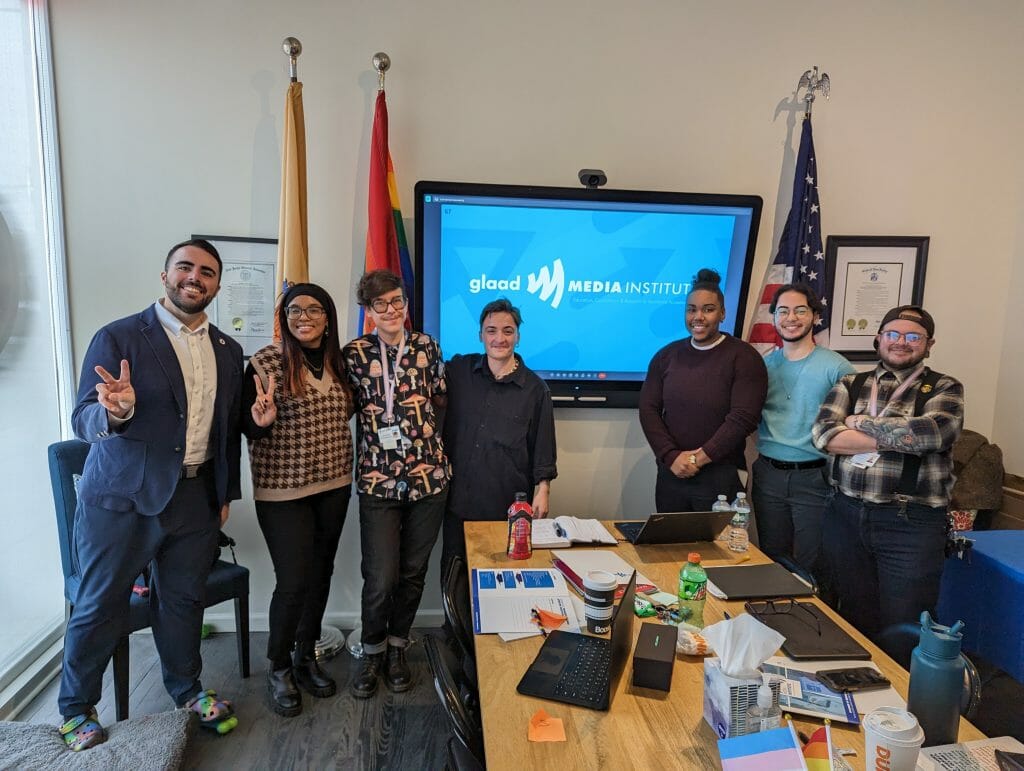The GLAAD Media Institute traveled to Asbury Park, New Jersey on Friday to present an Engagement 101 training to Garden State Equality (GSE), a statewide advocacy and education organization founded in 2004 that advocates for LGBTQ equality.
Together, 12 participants learned how to fortify their advocacy goals inside and outside of their organization, while providing the tools they need to hone their core message to reach their core audience throughout the state. Additionally, participants learned the basics of media structure and how to tell their stories in traditional, online, and social media platforms.
Lana Leonard, an associate at the GLAAD Media Institute, led the training. They worked with participants to reach and teach the movable middle about the LGBTQ community through compelling storytelling combined with the best and most up-to-date tools, and know-how, for general activism and media engagement.
Upon entering GSE Headquarters, three weekday morale boosting dogs rushed the door with licks, sniffs and paw shakes. All three belonged to GSE staff. The dogs are often in the office while the team works, and Friday was no different.
GLAAD Media Institute alum, Christian Fuscarino, executive director of Garden State Equality, came to the door which neighbors Frank’s Deli and Restaurant, famous for its homemade rye bread.
“Can I give you a hug,” he said to Leonard. Leonard is from this part of the Jersey Shore, and has known the GMI alum for years. “Of course! What a full circle moment,” responded Leonard, who has organized LGBTQ rallies on the post office steps just up the street.
Fuscarino has been executive director of GSE since 2016. The organization was originally founded with the mission to bring same-sex marriage equality to New Jersey. They succeeded in the 2013 case Garden State Equality v. Dow.
Now the organization is up against at least six anti-LGBTQ laws introduced into the New Jersey legislature (according to the ACLU) as well as holding Board of Education members accountable for anti-LGBTQ policy changes going against New Jersey’s LGBTQ inclusive curriculum mandate.
The audience was made up of ten GSE staff and two representatives of another GSE neighbor, the Prevention Resource Network of the Visiting Nurse Association of Central New Jersey’s (PRN VNACJ), which focuses on LGBTQ youth, harm reduction and HIV prevention.

“Not using the opponents messaging was my favorite part of the training,” said Fuscarino when describing the first time he experienced the Engagement 101 training with Ross Murray, Vice President of the GLAAD Media Institute, as the lead.
Other’s made comments on how the training would help them speak to the media.
“I think in terms of interviews, a lot of times, I’ve been thrown into them and it’s really short notice. I never knew I had the resources to, or I never knew that I had the skill set to be able to contact the [journalist] and ask for context, or to ask what they’re talking about,” said Deputy Director Brielle Winslow-Majette. Winslow-Majette said that she prepares for speeches when she must give them, and that prepping for interviews won’t be too different. By vetting journalists before the interview, Winslow-Majette said she will better develop her supporting messages along with confidence during the interview.

Others said the training will help them speak to a broader audience in their organizing work.
“I wasn’t necessarily thinking about the training in doing interviews or media. I was more thinking about getting my point across. Period. And like, how I speak at Board of Ed meetings; how I speak to people, you know, that are in the middle,” said Ethan Dayback, founder of the Transgender Empowerment Program at the VNACJ. While Dayback doesn’t often speak to the media, he does often go to Board of Education meetings in New Jersey to speak out against anti-LGBTQ policy changes.
Nevertheless, each individual present found usefulness to speak to both the media and their statewide moveable middle. This also included understanding how lived experiences overlap with the audience participants are trying to reach.
Winslow-Majette, for example, unraveled how her lived experience as a BIPOC LGBTQ person may be received differently by different audiences.
“I think it also comes down to the audience you’re talking to,” said Winslow-Majette. “So like for me, I think there’s a lot of benefit being a BIPOC, LGBTQ individual.” For the deputy director, her lived experience helps speak to a larger audience of people that feel like they have to choose between identities. If people don’t understand her on “a level of being BIPOC” then they may understand her on “a level of being queer”, and vice versa, she says.
Moreover, Aleyah Marie Lopez, GSE program manager and trainer, said that she was fully engaged in the presentation. She’s excited to bring some elements into her own work at Garden State Equality. “I feel like the training was very interactive. I think it’s a great way to get people engaged, and for people to invest in learning about [engaging an audience] using their own personal stories,” said Lopez. She also noted that she hopes to make storytelling a more important facet of her own training sessions in addition to her work in destigmatizing and eradicating HIV, and supporting sex workers’ right to access fair employment.













